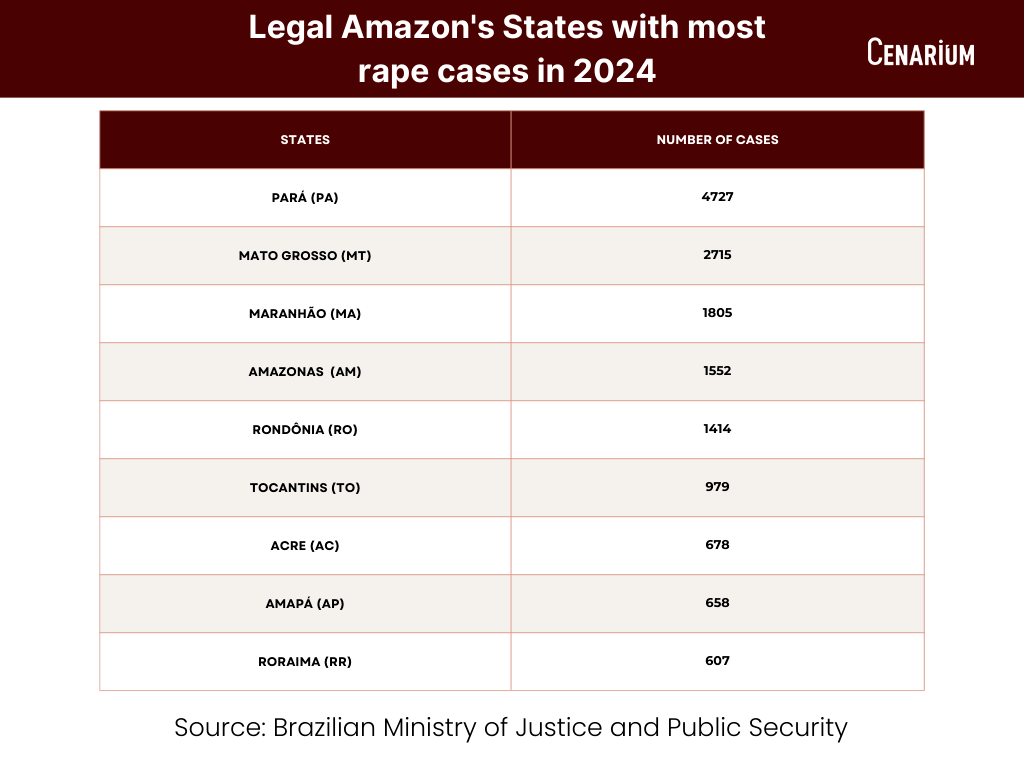COP30 host State leads rape cases in the Brazilian Amazon
24 de January de 2025

By Thais Matos – From Cenarium
MANAUS (AM) – Data from the Ministry of Justice and Public Security (MJSP) reveals that Pará topped the ranking of states in the Legal Amazon with the highest number of rape cases in 2024, recording 4,727 occurrences. Mato Grosso ranked second with 2,715 cases, followed by Maranhão with 1,805. Amazonas and Rondônia also showed alarming numbers, with 1,552 and 1,414 cases, respectively. Meanwhile, Tocantins (979), Acre (678), Amapá (658), and Roraima (607) registered lower but equally concerning figures.
Brazil as a whole recorded 78,395 rape cases throughout 2024, which equates to 214 victims per day or approximately nine victims per hour. São Paulo leads the national ranking, with 14,827 incidents, averaging 44 victims per day. The actual figure is likely higher, as São Paulo, Rio de Janeiro, Alagoas, and Roraima did not report data for December 2024.
Lawyer Amanda Pinheiro, president of the As Manas Institute, emphasizes that the recorded figures, particularly in Brazil’s Northern Region, highlight a cultural foundation of normalizing sexual crimes. “Combating this type of violence must start at the root in domestic and family education, as well as in schools. Police intervention only addresses the crime after it has occurred, while the State is responsible for pursuing punitive action against the perpetrator”, she explains.

The report also shows a 4.54% reduction in 2024 compared to 2023, when 82,191 cases were recorded. Women remain the primary victims, with 67,883 cases, while 9,682 victims were male.
The year 2024 also saw a significant number of femicides, with 1,399 cases reported—four women killed per day. São Paulo, Minas Gerais and Bahia rank as the top three states with the highest numbers of femicides, with 229, 133, and 107 cases, respectively.
The actual numbers may be higher since many of these crimes are only recognized when they occur in a domestic context and are characterized by violence perpetrated by partners or ex-partners. However, the legal definition is broader. This also applies to crimes related to sexual violence.
“The underreporting of crimes committed against women is alarming, with the recorded numbers reflecting only a portion of the sexual crimes committed. This is because such data is collected through a unified system used by police stations and hospitals, which not all municipalities have access to”, Pinheiro adds.
In 2024, Congress also passed a law making femicide a standalone criminal offense rather than a qualifier for homicide. Additionally, the penalty was increased to up to 40 years, and the law prevents individuals convicted of crimes against women from holding public office.
For Pinheiro, information remains the most effective tool in combating crimes against sexual dignity, and she supports the idea that sexual education should not be seen as sexualization.
“It’s about treating the body as personal and inviolable, for example, teaching children and adolescents about behaviors that violate this intimacy and the punishments for those who commit such acts. As a consequence of criminal behavior, punishing offenders through imprisonment and registration in a database of sexual offenders helps prevent and deter such actions. The social debate about the inviolability of the female body, for example, must be a constant topic for reflection, awareness, prevention, and combat”, she concludes.
National Registry of Pedophiles and Sexual Predators
In November 2024, President Luiz Inácio Lula da Silva (PT) vetoed a provision in Law 15.035/24, which creates the National Registry of Pedophiles and Sexual Predators. The system is to be developed using data from the National Registry of Persons Convicted of Rape.
The only vetoed provision was one requiring data retention for ten years after the full completion of the sentence. In a message sent to Congress, Lula stated that the measure was unconstitutional as it violated principles such as the right to privacy, honor and the image of the convicted individual.
The proposal that originated the law (Bill 6212/23) was presented by Senator Margareth Buzetti (PSD-MT). The text was approved by the Senate in May 2024. In October, the Chamber of Deputies approved a substitute to the project.

